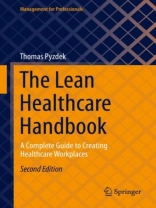The book shows readers exactly how to use Lean tools to design healthcare work that is smooth, efficient, error free and focused on patients and patient outcomes. It includes in-depth discussions of every important Lean tool, including value stream maps, takt time, spaghetti diagrams, workcell design, 5S, SMED, A3, Kanban, Kaizen and many more, all presented in the context of healthcare. For example, the book explains the importance of quick operating room or exam room changeovers and shows the reader specific methods for drastically reducing changeover time.
Readers will learn to create healthcare value streams where workflows are based on the pull of customer/patient demand. The book also presents a variety of ways to continue improving after initial Lean successes. Methods for finding the root causes of problems and implementing effective solutions are described and demonstrated. The approach taught here is based on the Toyota Production System, which has been adopted worldwide by healthcare organizations for use in clinical, non-clinical and administrative areas.
Mục lục
Part I: Lean Tools and Techniques.- 1. Introduction to Lean and Muda (Waste).- 2. Product Family Matrices.- 3. Spaghetti Diagrams.- 4. Value Stream Maps.- 5. Lean Value Stream Design.- 6. Standardized Work Design.- 7. 5S.- 8. Fast Work Changeover.- Part II: Continuous Improvement and Kaizen.- 9. Introduction to Continuous Improvement.- 10. Process Mapping- 11. Statistical Thinking.- 12. Descriptive Statistics.- 13. X-Charts.- 14. Pareto Analysis.- 15. Graphical Data Analysis.- 16. Problem Solving Tools.- 17. Project Management.- 18. Kaizen Events.- 19. A3 Thinking.
Giới thiệu về tác giả
Thomas Pyzdek is an internationally respected expert in process excellence. Through the Pyzdek Institute, he offers online training and certification in Six Sigma, Lean and Lean Six Sigma. Pyzdek serves on numerous editorial boards and has helped found such journals as
The Quality Management Journal,
Quality Engineering and
International Journal of Six Sigma and Competitive Advantage.











